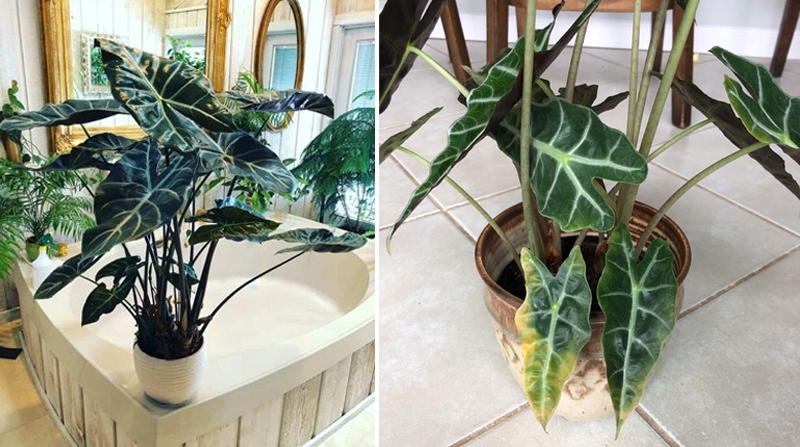Alocasia Polly, also known as African Mask Plant, is a stunning tropical houseplant famous for its large, glossy green leaves. This plant thrives when given the right care and growing conditions. One of the most important factors is using the proper potting mix. Selecting the best soil for Alocasia Polly will ensure your plant stays happy and healthy.
In this article, we’ll look at the key characteristics of quality Alocasia Polly soil and examine some excellent potting mix options With the right soil, your Alocasia Polly will flourish!
Why Soil Matters for Alocasia Polly
As a tropical plant that grows naturally in the dense humid rainforests of Asia Alocasia Polly requires specific soil conditions to mimic its native environment. Here are some of the main considerations
-
Moisture-retentive but well-draining Alocasia Polly likes consistently moist (but not soggy) soil. The soil must drain well to prevent rotting
-
Nutrient-rich: This fast-growing plant needs a fertile soil with essential macro and micronutrients.
-
Light and airy: Good aeration allows oxygen to permeate the roots. Dense, compacted soil will suffocate roots.
-
Acidic pH: Alocasia Polly thrives best in slightly acidic soil with a pH of 5.5-6.5.
Getting the soil right goes a long way in keeping your Alocasia Polly happy and allowing it to grow beautifully.
Characteristics of the Best Alocasia Polly Soil
When selecting a potting mix or creating your own blend, look for these ideal characteristics:
-
Good drainage: Contains porous materials like perlite, pine bark, or coconut coir. These create air pockets for drainage.
-
Moisture-retentive: Incorporates peat moss or coco coir to help soil retain moisture. Avoids quick drying out.
-
Nutrient-rich: Has organic matter like compost or worm castings to provide a fertility boost. Time-released fertilizer optional.
-
Lightweight: Made up of lightweight components like peat, bark, perlite. Allows air to permeate soil. Not dense or compacted.
-
Slightly acidic pH: A pH around 6.0-6.5 provides ideal conditions for Alocasia Polly.
-
Organic: Free of chemical additives, fertilizers, or pesticides.
Recommended Potting Mixes for Alocasia Polly
Here are some excellent prepared potting mixes tailored for Alocasia Polly and other tropical aroids:
Aroid Soil Mix
- Specifically formulated for aroids like Alocasia, Monstera, and Philodendron
- Contains peat moss, perlite, pine bark, charcoal
- Light, airy, and fast-draining
- Enriched with organic fertilizer
Orchid Potting Mix
- Made for epiphytic orchids but works for many tropicals
- Ingredients like fir bark, moss, perlite, and charcoal
- Excels at air circulation and moisture retention
Cactus & Citrus Potting Soil
- Designed for drought-tolerant plants but good for many tropicals when amended
- Fast-draining from sand, perlite and vermiculite
- May need added peat moss or coco coir for moisture retention
Organic Potting Mix
- General purpose organic mixes work if amended
- Must be lightened with perlite and supplemented with moisture-retentive ingredients
- Provides nutrients from composts and natural fertilizers
When buying bagged potting mixes, check the ingredients to ensure it contains suitable components for moisture-loving tropicals like Alocasia Polly.
You can also easily make your own aroid-specific blend by combining ingredients like peat moss, orchid bark, perlite, and coco coir.
Providing the Ideal Soil Environment
Whichever potting mix you choose, also follow these tips to create the best possible soil environment:
- Further amend dense soil by adding extra perlite for aeration
- Top off pots with bark or moss to retain moisture between waterings
- Allow soil to dry out partially between waterings to prevent oversaturation
- Test drainage by watering thoroughly and ensuring excess drains out the bottom
- Add slow-release organic fertilizer a few times per year for nutrients
- Repot annually in fresh soil to replenish nutrients
By selecting an optimal potting mix and fine-tuning the soil environment, your Alocasia Polly will flourish with healthy, vibrant foliage. Give this magnificent tropical plant a home in soil it loves!
ALOCASIA POLLY PLANT CARE | dormancy, propagation + more! | alocasia amazonica
FAQ
What is the best soil mix for Alocasia?
What is the best medium for Alocasia Polly?
What do Alocasias grow best in?
When should I repot my Alocasia Polly?
- A Complete Guide to Caring for Yuki Cherry Blossom Shrub - January 23, 2025
- Identifying Red Hot Poker Seeds: What to Look For When Harvesting Torch Lily Pods - January 23, 2025
- A Complete Guide to Harvesting Evening Primrose Seeds - January 23, 2025

